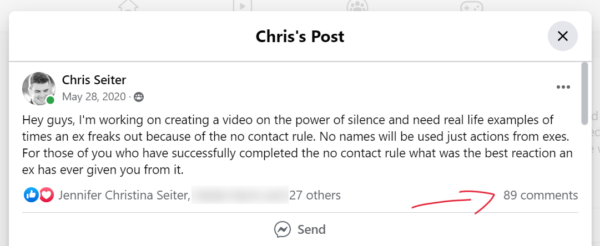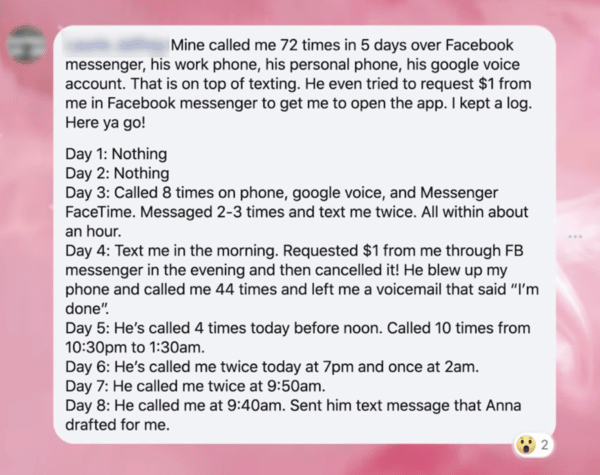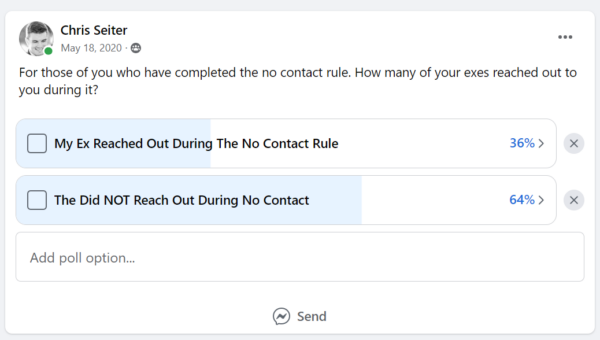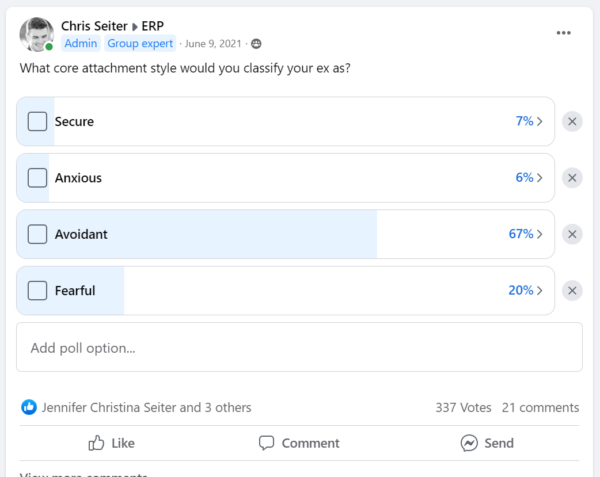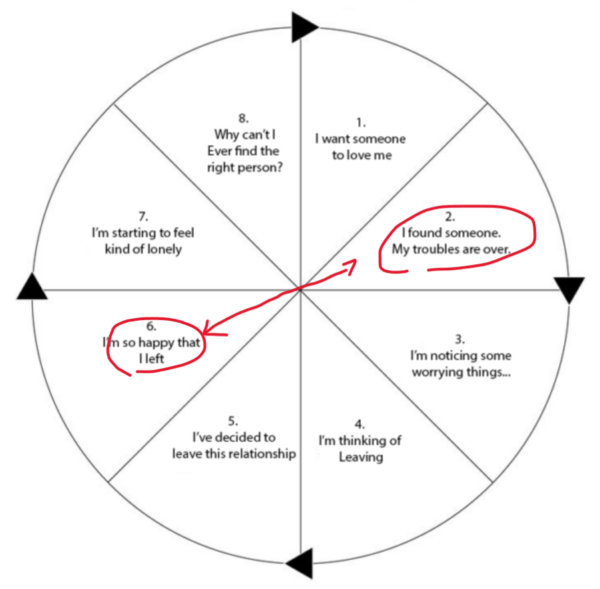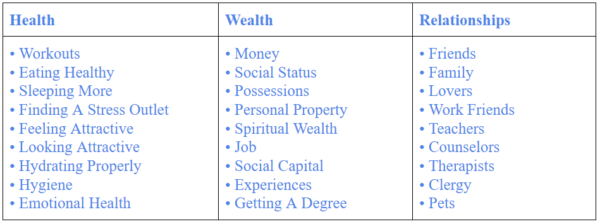I’d like to take an in-depth look at how silence impacts an ex. Honestly, this whole topic led me down a rabbit hole I wasn’t expecting. I mean, I started looking at stuff that doesn’t even seem like it has anything to do with silence (but it does.)
Today we’re going to look at concepts like
- Operant conditioning
- Loss aversion
- Abstinence violation
- Psychological reactance
- Why exes will miss you (but not the way you think)
- The role of attachment theory
- Why your time is so important
- The importance of trinity work
Like I said, there’s a lot to talk about today.
Let’s get started

What Are Your Chances of Getting Your Ex Boyfriend Back?
Take the quizPsychological Concepts Associated With The No Contact Rule
So, pretty much when you’re looking at what silence does to an ex, you’re looking at studies with the no contact rule.
Now, I’ve talked a lot about the no contact rule in the past,
And probably one of the best articles that I ever wrote on the subject was one I wrote last week.
In it, I discussed the psychology of exes during no contact.
A lot of the stuff that I’m going to be talking about in this article was also covered in that article, just in the spirit of being honest.
But the no contact rule essentially refers to this time where you’re cutting off all conceivable communication with an ex after a breakup.
I talk a lot about how most people look at the no contact rule as a way to trick their ex into missing them. And I think it’s really important that we do not do that.
In fact, if you end up doing that and that’s your intent with the no contact rule, then it usually has the opposite effect. It’s usually only those who use the no contact rule to outgrow their ex who end up having the positive results they want, assuming they want their ex back.
But what’s really interesting about the no contact rule is there’s a lot of psychological concepts associated with it.
Psychological Reactance
Perhaps one of the most famous ones is that of psychological reactance, which is basically this psychological concept that states we’re all born with behavioral freedoms. But when someone takes that freedom away, we’re a lot more likely to respond in ways to try to re-obtain that freedom.
So part of the thinking there is that, hey, by using silence on an ex, I’m taking away their behavioral freedom of talking to me, of communicating with me. This is going to make this ex a lot more likely to reach out to me.
And in some cases, we’ve actually seen that to be the case.
One of the probably most famous examples is when I asked our community, “Hey, give me some examples of some of the craziest things your ex has done during a no contact rule.”
One person responded that their ex contacted them something like 72 times in five days.
This is a really prime example of psychological reactance rearing its ugly head. But there’s also all sorts of other little psychological concepts that are associated with silence and the no contact rule.
Operant Conditioning
Perhaps one of the most popular ones is operant conditioning. This is a behavioral psychology concept from B.F. Skinner.

What Are Your Chances of Getting Your Ex Boyfriend Back?
Take the quizBasically, it describes how behaviors can be increased or decreased based on consequences. If an individual was used to receiving emotional validation and attention from their ex and it suddenly stops, they might potentially experience a kind of withdrawal.
This can increase certain behaviors like reaching out, reminiscing, or even bargaining in an attempt to regain that lost positive reinforcement.
There’s actually a really famous scene from a TV show called “The Big Bang Theory” where Sheldon, who is one of the main characters, is trying to use operant conditioning on Penny to try to get her to learn; I think he was trying to teach her a class or something.
But basically, for every right answer she gives or something like that, he’ll give her a chocolate, and it eventually starts working, and that’s the funny part of the joke in the TV show.
Essentially, that’s what’s going on.
Instead of using positive reinforcement, you can use negative reinforcement as well. And that’s kind of what the no contact rule is meant to be doing. Operant conditioning can also lead to psychological reactance type responses where you have an ex contacting you 72 times in 5 days.
Loss Aversion
Another big psychological concept associated with silence is loss aversion. According to prospect theory in cognitive psychology, people feel the pain of loss more acutely than the pleasure of an equivalent gain.
So the loss of contact and connection can feel disproportionately painful, making that person focus heavily on what’s been lost. This is actually one of the reasons why I think that warning your ex that you’re going into the no contact rule can be not beneficial.
There are some instances where I think it can be beneficial, and we certainly have clients who warn their ex and say,
“Hey, I need a timeout; let’s talk again in 21 to 30 days.”
But I’ve always been sort of a little bit more harsh. I kind of subscribe to the loss aversion thing. So with loss aversion, you’re basically saying that when people feel the pain of loss more acutely, they’re going to experience much more potent emotions and focus heavily on what’s been lost. It’s a softening of the blow by warning your ex that you’re going to be silent for a while versus just simply doing it.
By simply doing it, you really tap into the loss aversion and give yourself the best chance of having them go through that reactance, operant conditioning, or things of that nature.
The Abstinence Violation Effect
Then, of course, you have to consider the abstinence violation effect.
This actually comes from a bunch of addiction studies.
When someone is trying to abstain from a particular behavior, like contacting an ex, even a small slip-up can lead to feelings of failure and a belief that one doesn’t have control, which can actually lead to more of the undesired behavior.
I included this one because while we’re talking a lot in this article about what silence does to an ex, I think it’s really important to consider what silence does to the person who’s ignoring the ex.
We’ve found that a good portion of our clients who implement silence or some form of no contact will end up slipping up and breaking it. When they break it once, they’re actually more likely to break it again and again, and that comes from this abstinence violation effect.
The abstinence violation effect originates from addiction studies, but what’s interesting is when you go through a breakup and study the brain during it, the same part of the brain that is activated during that breakup is the same part that’s activated when a drug addict is going through withdrawal.
So you’re experiencing similar effects as you would when you’re addicted to a substance, which I think the abstinence violation effect helps explain.
The Assumption Is That It’ll Make Them Miss You (Well… Not The Way You Think.)
Now, the underlying assumption behind all of the psychological components I just listed is that, “Hey, the no contact rule and silence are more likely to make your ex miss you.”
And for the most part, I think this is right, but it’s not in the way that you think.
So let’s get one thing really clear.
The natural assumption is that operant conditioning, loss aversion, abstinence violation, psychological reactance, all of these are more likely to make you or your ex contact one another.

What Are Your Chances of Getting Your Ex Boyfriend Back?
Take the quizYet, when I polled our community, people who have done the no contact rule, and asked them, “Hey, how many of your exes actually reached out to you during silence and during the no contact rule?” 64% of participants said that their ex didn’t reach out to them at all during a no contact rule.
We think this is because most exes tend to be avoidant. I also asked our community, “Hey, what core attachment style do you think your ex is?”
And 67% of people believed that their ex was avoidant.
Now, the thing you have to understand about avoidants is that they actually love taking time apart. Their core wound revolves around independence, so they genuinely value their independence.
An interesting phenomenon occurs when you use silence on someone with an avoidant attachment style. I’ve frequently mentioned in the past that avoidants typically experience two honeymoon periods: the honeymoon period with you and then the honeymoon period without you.
What often happens is that those who cannot employ silence after a breakup might inadvertently extend the avoidant’s honeymoon period without them. This is because an avoidant usually just wants space.
Continuously pestering them can make them more likely to distance themselves further.
They won’t think fondly of you or miss you. They won’t be affected by operant conditioning or psychological reactance. Instead, they’ll likely think, “I’ve regained my independence, and I’m content.”
The Real Benefit Of Silence Is What You Are Doing With Your Time
However, the real benefit of using silence on an ex hinges on how you spend your time during that period of silence.
It might sound cliche, but it rings true.
A few years ago, I made a video titled “How to Make an Avoidant Ex Miss You,” which remains one of my favorites.
I reference it frequently in various articles.
In that video, I delve into the idea that avoidants will only long for you once they sense you’ve moved past the relationship and there’s no looming threat of reconnection.
This is what avoidants respond to. They thrive in low commitment environments.
As I mentioned earlier about the two honeymoon periods, these are typically the times when an avoidant feels happiest: when there’s no pressure to climb the commitment ladder.
This is evident during the honeymoon phase at the start of a relationship and during the post-breakup phase when they bask in the elation of newfound freedom.
A potential reason avoidants respond favorably to silence is that it fosters this low-commitment environment. If they perceive you’re moving on, they often succumb to their nostalgic tendencies.
They reminisce about past positive experiences, painting a picture of you as the elusive “one that got away.” However, continuously reaching out and foregoing silence ensures you won’t be viewed in this light.
So, the ultimate question is, how should you spend your time during this silence?

What Are Your Chances of Getting Your Ex Boyfriend Back?
Take the quizHere’s How You Should Be Spending Your Time During Silence
That brings us back to the fundamentals.
I’ve frequently discussed the pillars of health, wealth, and relationships – what I refer to as the Holy Trinity – throughout the history of this website.
The underlying theory is straightforward:
After a breakup, your Trinity becomes unbalanced. For those unfamiliar with the concept, the Holy Trinity is an idea I developed to help individuals categorize their lives into three distinct areas.
- Health
- Wealth
- Relationships
The ultimate goal is to find a balance within these areas while also recognizing the inherent challenge in achieving perfect equilibrium.
For instance, one cannot realistically work out for eight hours daily, barring perhaps professional athletes. Recognizing that no one can devote an entire day to a single aspect of their life, it becomes about striving for a balance rather than achieving perfection.
An intriguing aspect of the Trinity is its interconnectedness. A significant disruption in the relationships component, such as a breakup, often cascades into the other areas.
For instance, post-breakup sadness might deter you from exercising, leading to weight gain, which exacerbates the depression. This emotional state may then hamper your work performance.
This chain reaction, triggered by a single breakup, illustrates the domino effect.
However, if one area can detrimentally influence the others, the reverse can also be true. Rebuilding relationships can start by focusing on your health, wealth, and nurturing relationships outside of romantic interests. By taking positive steps in these areas, you can realign the balance within the Trinity.
Yet, I believe there’s a deeper level to consider.
It’s crucial to identify something—or a goal—as meaningful to you as your ex, if not more so. We’ve observed that many of our clients exhibit codependent tendencies, struggling to envision a life without their ex.
Such a mindset complicates the Trinity work, as actions are often tailored to impress the ex, rather than pursuing passions.
Therefore, I always advise individuals to reflect on their life’s magnum opus, something that resonates as deeply as their feelings for their ex. Ideally, this magnum opus should touch upon all three facets of the Trinity, enhancing mental or physical health, contributing to one’s wealth, and fostering new, enriching relationships.
Immersing oneself in this pursuit naturally shifts focus away from the ex, establishing an independent trajectory for personal growth.
This independence doesn’t only appeal to those with avoidant attachment styles but also signals to them that it’s safe to feel nostalgic or miss the past relationship. And that, ultimately, is how time during periods of silence should be spent.
